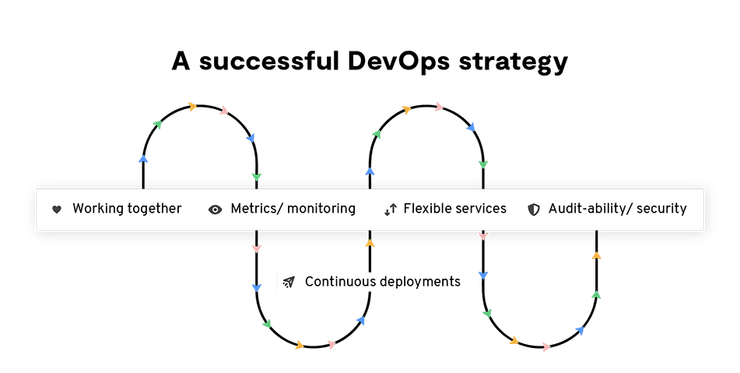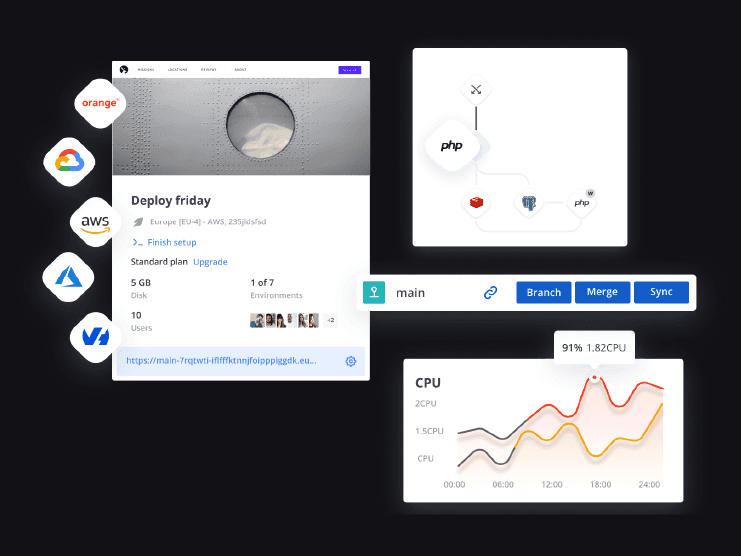Forrester Research interviewed digital leaders at enterprise organizations and found that, on average, they were maintaining 268 customer-facing websites and applications.
As the number of websites you manage continues to grow, so do the number of challenges in managing it. Often the websites are designed by different teams, are built using different languages and frameworks, and run on different hosting solutions with different DevOps tools and workflows. What is the secret to managing a diverse and sprawling website portfolio at scale while still controlling costs and driving predictability?
A unified DevOps strategy
We’re all familiar with DevOps: combining software development and IT operations to shorten development life cycle and supply continuous delivery. A unified DevOps strategy delivers the same promise of speed, security, and predictability, but standardizes it across all your websites and applications. It sounds simple, but many haven’t taken the time and resources to make it a reality.

If you haven’t incorporated a unified DevOps strategy into your website management strategy, then you’re feeling the results. Your IT expenditures are swelling alarmingly, your development teams are working at cross-purposes, and your security protocols are patchy and difficult to coordinate. When different websites and applications follow different DevOps procedures, developers struggle jumping into different projects and therefore they become siloed and collaboration is constrained. Now’s the time to change that.
The key to an efficient DevOps strategy
While it provides many valuable benefits, a unified DevOps strategy is incredibly complex to manage. It usually requires an organization to have a team dedicated to build and maintain a DevOps platform capable of:
- Developing, testing, and deploying apps and websites
- Managing and tooling DevOps
- Managing and budgeting technology stacks and infrastructure such as AWS or in-container orchestration frameworks like Kubernetes
However, rather than creating your own unified DevOps platform, you can partner with a Platform as a Service (PaaS) provider to build and maintain the platform and all its components. You and your team are then free to focus your resources on developing outstanding websites and applications.
Platform.sh - The solution to your DevOps strategy
With Platform.sh, you’ll be able to reap the full benefits of your unified DevOps strategy.
Platform.sh provides:
- Centralized management and patching of all your sites and apps
- Git-driven workflow for code and automated infrastructure builds
- Support for over 70 programing languages and frameworks
- Fully managed database services
- Integration with popular development tools
- Certified security and compliance
Everyone benefits from using Platform.sh
Development team
- Create with multiple languages and frameworks
- Use Git-driven workflow for code and infrastructure
- Clone new dev environments instantly from production
- Add and update services with a few lines of configuration
CIO & IT teams
- Ensure IT governance for all websites, from the largest to smallest
- Reduce costs and duplication of services and effort
- Ensure security and compliance across the board for the organization
- Let business units and marketing work with the agencies of their choice without compromising security, compliance, and data confidentiality
Digital teams
- Deploy faster, safer, and more regularly
- Manage business-critical applications and constellations of smaller sites in the same efficient, cost-effective manner
- Increase the pace of innovation
- Reduce costs and operational burdens
- Choose the tools and frameworks that work best for their use cases and team
- Quickly onboard agencies or contractors, without compromising your security and compliance
Security teams
- Patch all their sites centrally
- Secure their data with fully managed database services
- Ensure governance over technology and processes
- Provide high availability SLAs (up to 99.99%)
- Rely on 24x7 global support
Next steps
Our team is available to answer any questions you have about unifying your DevOps strategy and how Platform.sh can help.
Talk to an Expert Switching to Platform.sh can help IT/DevOps organizations drive 219% ROI
Switching to Platform.sh can help IT/DevOps organizations drive 219% ROI Organizations, the ultimate way to manage your users and projects
Organizations, the ultimate way to manage your users and projects









